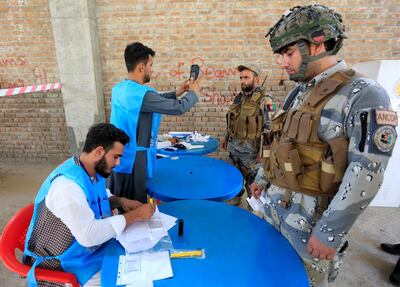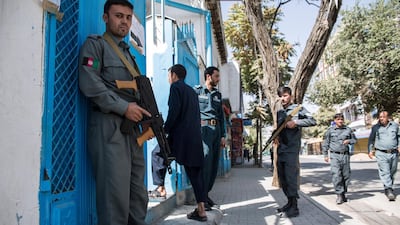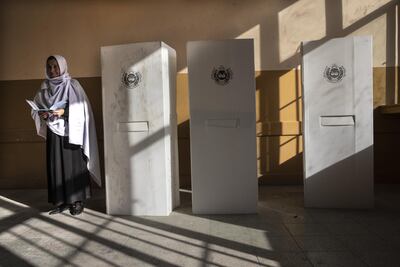There was a low turnout for Afghanistan's presidential election on Saturday amid a string of Taliban attacks, despite heavy security.
Streets and polling centres across the capital, Kabul remained empty after the Taliban ordered attacks on voting centres. Widespread mistrust that the election would be fair also deterred many.
Ali Adili, an election observer in the northern province of Takhar and an expert with the Afghanistan Analysts Network, estimated that less than 50 per cent of registered voters turned out as President Ashraf Ghani takes on his main rival, Chief Executive Abdullah Abdullah.
However, a representative for Mr Ghani’s campaign, Javid Faisal, tweeted that "the turnout has so far been impressive. People are yet again showcasing great valour in the face of Taliban, other terrorists and our external enemies".
Official voter figures will not be available for a few days. Preliminary results are due on October 19 and the final outcome will be announced on November 7.
About 5,000 polling centres were open in schools and mosques throughout Afghanistan’s 34 provinces, but more than 400 had to be closed due to security threats. Afghanistan’s Independent Election Commission said that it had lost contact with just over 900 centres.
Voting was extended in a bid to boost numbers amid a series of terrorist incidents across the country. The Ministry of Defence said the Taliban launched 68 attacks , even though more than 80,000 members of the security forces were on duty.
At least 17 people were wounded in a blast outside a polling station in the southern city Kandahar. In Kunduz, in the north, a rocket killed an election observer and improvised explosive devices disrupted voting centres across the capital.

Despite being heavily guarded by armed police, there were no queues outside the Mohammed Dad Mosque in central Kabul. Raila, 68, who only goes by one name, cast her vote at the mosque-turned-polling station.
"I wasn’t scared to come, even though there’s not much security in our country," she said, holding up her signed finger – a sign that she had voted. "Voting is my contribution to a peaceful future, even if it means taking a personal risk."
There were more election workers at the centre than voters but the atmosphere remained positive.
"We’re here to spread good energy for our country," said Wazhma Azimi, one of the women hired by the Independent Election Commission to oversee a team of election workers. She said that although 4,200 people were registered to vote at the mosque, few of them showed up.
The day was also mired by technical faults.
"The names on the voter lists did not always correspond with the data on the biometric machines, which led to the disenfranchisement of several voters," said Nishank Motwani, an election observer who visited several polling stations across Kabul. "The biometric machines in some cases had no signal to process voter verification either."
Why is the election important?
Although the election was endorsed by President Ghani, a US-Taliban peace deal could have led to its postponement and an interim government put in place instead. But with US President Donald Trump calling the deal "dead" earlier this month, the election moved back on to the main agenda.
Afghanistan's next leader will take on a country devastated by four decades of war, where thousands are killed every year. Thirteen former warlords, spies and members of the country's former communist government are in the running.
If no candidate gets 51 per cent of the vote, a second round will be held between the two leading candidates.
Since the invasion in 2001, the US has been trying to negotiate an end to the conflict with the Taliban. The US currently has about 14,000 troops in Afghanistan, and there are thousands more from other Nato countries.
The last election, which took months to reach a result, was plagued by allegations of fraud and vote rigging.
Much of the campaigning this time has been done remotely, with candidates making video calls to address rallies and avoid security threats.
At one of the few rallies Mr Ghani attended in person, in Parwan province beside Kabul, a suicide bomber killed at least 26 people. Survivors later complained about not having received the 500 Afghanis (Dh23) they were promised to attend the rally.
Earlier this month, the Taliban's chief negotiator said their "doors are open" should Mr Trump want to reopen peace talks, hours after two attacks by the insurgents killed at least 48.
"Peace is the first desire of our people," Mr Ghani said on Saturday. "Our road map is ready, I want the people to give us permission and legitimacy so that we pursue peace."


